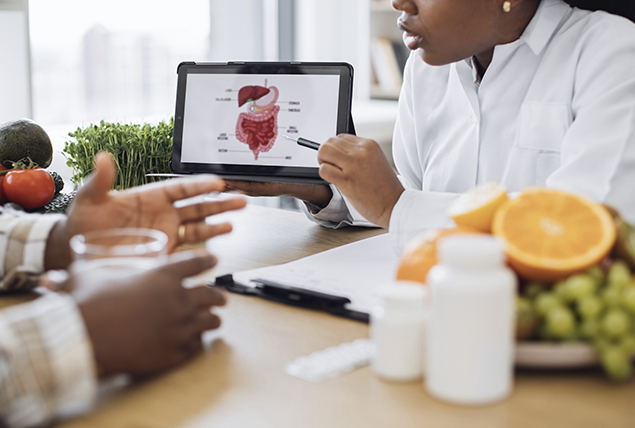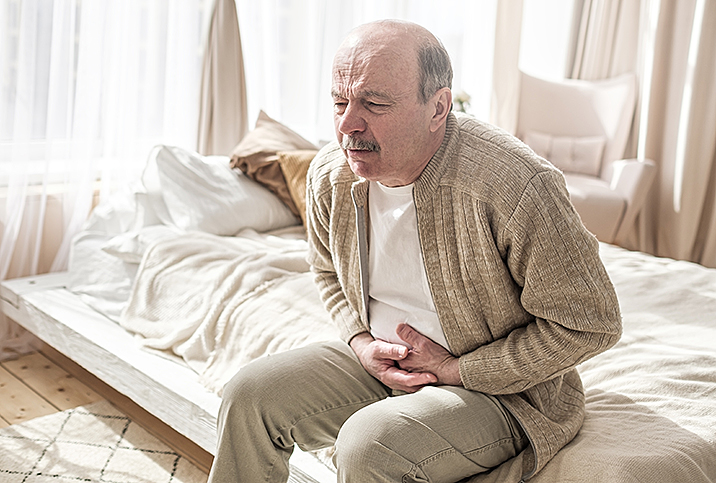Is IBS Self-Diagnosable?

Irritable bowel syndrome (IBS) is a functional gastrointestinal condition with symptoms that may overlap with certain disorders such as celiac disease, endometriosis, inflammatory bowel disease (IBD) and others. In fact, the severity of symptoms and the predominant subtype play an important role when treating IBS.
Due to this complexity, IBS is typically classified based on the symptoms that a patient experiences. These symptom-based subtypes include the following:
- IBS-C. Describes people who are constipation-prone
- IBS-D. Describes people who are diarrhea-prone
- IBS-M. Describes people who have a mix of constipation and diarrhea
- IBS-U. Describes people who have IBS but don't fall under the above categories
Can IBS be cured permanently? No, IBS is not curable, but most patients find success in managing symptom severity. You don't have to give in and say, "IBS is ruining my life." Receiving an accurate diagnosis is the first step toward a management plan that sustains a high quality of life.
How to diagnose IBS
Other types of gastrointestinal disorders mimic the symptoms of IBS, and some of them are much more dangerous. So doctors must first ensure a patient is suffering from irritable bowel syndrome and not some more serious. One way they do that is by using the symptom-based criteria provided by the Rome Foundation's latest guidelines. Called Rome IV, the criteria are based on four essential features: clinical history, physical examination, basic laboratory tests and further investigation.
Patient's clinical history
Abdominal pain must be present and associated with abnormal bowel habits and frequency. Stool consistency should also be factored in.
Physical examination
A routine physical examination for IBS may involve taking the patient's vital signs, performing a thorough abdominal examination by feeling for any masses or abnormalities, checking for signs of dehydration and possibly performing a rectal examination.
Basic laboratory testing
This testing may include blood work, stool samples, imaging tests or other diagnostic procedures. This is meant to rule out other potential autoimmune or digestive disorders such as celiac disease, IBD, lactose intolerance, fructose intolerance and microscopic colitis, to name a few.
Keep in mind that it is possible to have an autoimmune or digestive disorder while also having a functional disorder like IBS, and the presence of one does not exclude the other.
Further investigation if red flags are present
There are certain "alarm features" that may indicate the presence of a more serious condition in patients being evaluated for IBS. These features include:
- Unexplained weight loss
- Old age
- Inflammation
- Rectal bleeding
- Anemia
- Fever
- The presence of an abdominal mass
If any of these alarms are discovered, further investigation may be necessary and colonoscopy or other appropriate examinations may be warranted.
Dietary and lifestyle advice
After ruling out potential autoimmune/digestive disorders and assessing symptom profile/severity (during the diagnosis), dietary and lifestyle advice is offered. By now, your physician will know your IBS subtype and recommend dietary or lifestyle modifications to manage the patient's predominant symptom: diarrhea, constipation or mixed.
The physician needs to educate and encourage the patient while providing realistic expectations, IBS is only manageable. Also, IBS is benign and does not pose a higher risk of developing long-term health issues.
Dietary advice depends on subtype, and your physician may refer you to a dietician or nutritionist who may recommend a variety of approaches.
"Diet is a major component of IBS treatment and management. Certain foods that are otherwise considered healthy may trigger symptoms for persons with IBS," said Beata Rydyger, B.Sc., R.H.N., a registered nutritionist based in Los Angeles and a clinical nutritional advisor to Zen Nutrients. "That is why it is important to work with a certified nutritionist to develop an individualized food protocol."
She mentioned the low-FODMAP diet as a generalized diet that has shown success for IBS symptom management. A low-fermentation diet is another. A low-FODMAP diet limits fermentable oligosaccharides, disaccharides, monosaccharides and polyols, sugars that the small intestine has trouble absorbing, according to Johns Hopkins Medicine.
"Both focus on removing foods containing sugars that ferment in the gut and feed the bacteria linked to IBS," Rydyger added.
Your healthcare provider may also recommend lifestyle changes like regular physical activity, which can help to improve overall gut health by promoting regular bowel movements, reducing abdominal discomfort, and reducing overall stress and anxiety.
Pharmacological treatments for IBS
The specific drugs a gastroenterologist may recommend depend on the IBS subtype or dominant symptom that a patient experiences. Generally, this step is taken after diet or lifestyle modifications prove to be ineffective. Your healthcare provider may recommend the following first-line options.
First-line option for IBS-D (diarrhea-predominant)
Loperamide is an antidiarrheal medication that helps the stool become firm and reduces diarrhea. It works by slowing down the movement of the intestine, which helps the stool to get firm. Loperamide is typically recommended at low doses and regular intervals.
First-line options for IBS-C (constipation-predominant)
Soluble fibers such as psyllium or ispaghula husk are common options for people with IBS-C. Soluble fibers are tolerated much better by IBS patients, according to researchers.
Osmotic laxatives are also common in the treatment of IBS-C, including PEG (polyethylene glycol). Laxatives should only be used for short-term relief and are not recommended as a long-term solution.
First-line options for pain
Antispasmodics help with the pain caused by diarrhea or constipation. These could include Eluxadoline, low-dose tricyclic antidepressants (TCA) and 5-HT3 antagonists. Such medications may come with potential adverse side effects. Discuss their proper use with a doctor and take them responsibly.
Psychological treatments for IBS
Irritable bowel syndrome is heavily associated with mental health issues such as anxiety, depression, sleeping disorders and stress. The psychological factors are known to further exacerbate symptoms if they are neglected. If a patient shows no improvement with first-line interventions, a physician may recommend more powerful neuromodulators, such as:
- Tetracyclic antidepressants
- Selective serotonin reuptake inhibitors (SSRIs)
- High-dose tricyclic antidepressants (TCAs)
- Serotonin and norepinephrine reuptake inhibitors (SNRIs)
Alternatively, nonpharmacological solutions have been shown to improve refractory (treatment-resistant) symptoms as well. These include:
- Cognitive behavioral therapy
- Hypnotherapy
- Psychotherapy
Multidisciplinary approach
When a patient's symptoms fail to subside regardless of first-, second- or third-line treatment options, it's time for a multidisciplinary approach. At this stage, the physician will summon a team of specialists to draft a specific patient-centric treatment plan with the input of a pain specialist, gastroenterologist, nutritionist/dietitian, psychologist, psychiatrist and others deemed appropriate.
A good physician-patient relationship is key when treating irritable bowel syndrome, and patients should be well-educated on their condition. Ultimately, IBS is benign and does not typically progress or evolve into any dangerous long-term health issue. Most patients will find success and will not need a multidisciplinary team.
IBS and sexual health
IBS might get in the way of being intimate. Some people will delay the progression of a new relationship, according to Anna Mapson, a registered nutritionist in Bristol, England, who specializes in IBS. Patients have told her they were scared to stay overnight in case their new partner smelled or heard their gas while they were asleep. People with IBS also often worry about using a toilet in public or in a partner's home due to potential smells or noises.
"The biggest impact IBS can have on sexual health would be the connection with body trust and image," said Erin Judge, a registered dietitian nutritionist who specializes in digestive disorders in Nashville. "For many, their symptoms can be triggered quickly, which can leave them fearful of intimacy and getting too close to others. Symptoms can also worsen body image, which can leave many isolated and distant from relationships."
Some people with IBS experience poor pelvic floor muscle function, which can also impact sexual health, she added. Pelvic pain may be common and sex can make it worse.
A flare-up can lessen the desire for intimacy.
"You're not going to want to be touched or touch other people when you're experiencing digestive discomfort," said Amanda Sauceda, a registered dietitian nutritionist and the founder of The Mindful Gut in Long Beach, California. "If IBS isn't flaring, it could also impact someone's sexual health because they may feel self-conscious about their digestive issues."
People living with IBS might worry about where they go out to eat on a date because they don't want to eat something that will upset their stomach.
"The key to IBS and sexual health is communication," she said. "Everyone poops, and having digestive concerns doesn't have to be a taboo topic. Be open and honest with your partner about how you're feeling and what's going on."
IBS and the immune system
About 80 percent of our immune system lies in the gut, according to Molly Warner, an accredited practicing dietitian and certified intuitive eating counselor in Queensland, Australia. She added that inflammation may play a pathogenic role in IBS. Studies have highlighted the persistence of mucosal inflammation at the microscopic and molecular level with irritable bowel syndrome.
But its impact on the immune system changes on a case-by-case basis.
The impact on the immune system depends on several factors, including the symptoms, how long they are present and how intense they are, according to Jelena Vulevic, a gut microbiologist in Reading, England, with more than 20 years of experience.
Combine that with the following:
- GI microbiota make-up
- Diet
- Lifestyle
- How many triggers there are to the symptoms and what they are
- Genetics
"Generally speaking, at least some negative impact on the immune system will be experienced by all IBS individuals," Vulevic said. "The reason is that digestive issues, however small, have a large impact on the microbiota and the rest of the GI environment, which in turn has a significant impact on the immune system. Finding the right supplement that aims to strengthen gut health is important here."
Doing so is important because it can help the immune system function even if it has no effect on the IBS symptoms.
How do diet and IBS go together?
"Anecdotally, most people I meet in the clinic with IBS have already changed their diet, usually avoiding meals, avoiding foods or avoiding nutrients," Warner said. "Many are avoiding social events for fear of symptoms flaring up or because they don't know what to eat or refuse to eat what is provided."
Dietary components have a profound effect on the GI microbiota and are the main triggers of symptoms, so changes here will undoubtedly be required, according to Vulevic. It's impossible to have generalized advice since we are all different and so is our microbiota. However, with the appropriate analysis, monitoring of the symptoms and supplementation, it is possible to arrive at the point of very little dietary or lifestyle change.
Everyone can have different foods that can trigger symptoms, Sauceda said. This is why it's important for IBS patients to find out which gut-friendly food works best for them to manage their condition better. Patients have a couple of different ways to do so—keeping a food diary and trying an elimination diet or a low FODMAP diet are possibilities—but she cautioned that restriction of foods can make things worse for the gut in the long run. Hence, it's important not to eliminate foods forever.
"Around 3 in 4 people do well on the low FODMAP diet, which removes foods such as onions, garlic, pulses and beans, avocado, mushrooms, tomatoes, grapes, and high-lactose foods such as cow's milk," Mapson said. "This diet is not meant to be followed long-term because it can starve out your beneficial gut bacteria and also affect nutrient availability in the diet."
Many people with IBS avoid foods that set off their symptoms just once or twice, Mapson added. Often, however, they don't know those are triggers.
"[As a result,] they can become quite anxious about eating out or eating food they haven't prepared," she said.


















